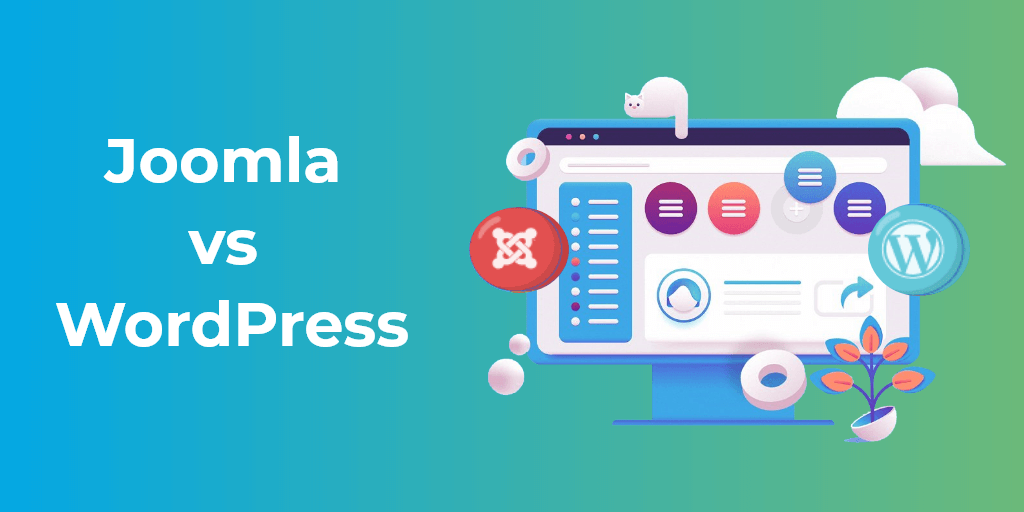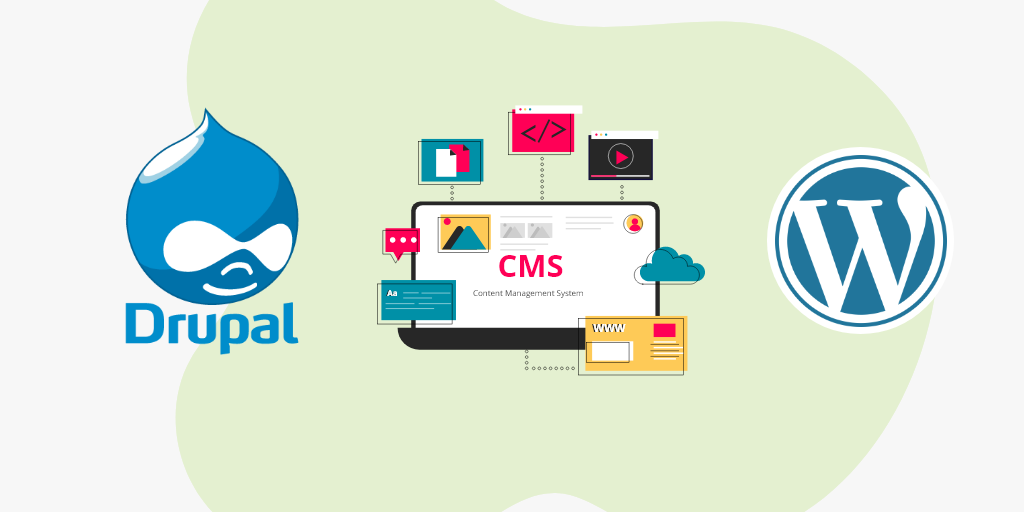Joomla vs WordPress – Which One is Better?

Joomla vs WordPress? This is 2020, not 2010; when it would have been relevant to post such an article.
Believe it or not, Joomla isn’t extinct. Though overshadowed by WordPress today, in its prime, Joomla was giving WordPress some serious competition.
Joomla isn’t as popular today as it once was. However, it still occupies a fair share of the CMS market. A major question that arises from this is whether the platform is still capable of stacking up against WordPress – the proverbial goliath of the CMS market.
Since we’ve already covered WordPress vs Wix and Weebly vs WordPress, it’s time we go on to cover WordPress vs Joomla.
We’ve also written this post covering the most common WordPress alternatives. Check it out for a bird’s eye view of all the options you have.
What we’ll cover:
We’ll begin by giving you a run-down of the time when the two platforms came to be, and when their rivalry began. Next, we’ll cover the advantages users can gain from using each platform and how easy the setup process is. Afterwards, we’ll talk about extensibility, and how you can improve the website experience through extensions and themes. Lastly, we’ll cover each platform based on security protocols.
So, let’s begin.
Joomla vs WordPress: An Introduction
For over two decades, both WordPress and Joomla have been operating as powerful content management systems.
Let’s take a look at their humble beginnings and evolution over the years.
Launched as a fork of a blogging platform b2/cafelog back in 2003, WordPress has, since then moved away from being just for bloggers. It’s a powerhouse that powers 39% of websites which include corporate businesses, supermarket chains, local businesses, and even the website of the White House.
Launched at the same time as WordPress but behind it in terms of popularity, Joomla is the fourth most popular content management system with 1.5+ Million active websites and a 3% market penetration.
Before 2010, Joomla and WordPress were the market leaders in the CMS market. Since then, WordPress has been the dominating force in the industry. Joomla, sadly, has fallen behind to competing with new CMS’s such as SquareSpace and Wix.
While Joomla has fallen behind in terms of popularity, it doesn’t mean the platform is dead and has no redeeming features!
Individual Advantages of WordPress and Joomla
On both sides of the user spectrum, you will find die-hard fans who will defend even the flaws associated with each platform. While it’s justified to a certain extent, such a debate doesn’t lead to a proper understanding of each platform.
In general, here are some advantages associated with each platform:
Advantage of WordPress:
- Ease of Use: WordPress is hands-down the easiest platform to get started. Whether you’re looking to create a simple business profile website, or a full-fledged eCommerce store, the learning curve isn’t steep.
- Blogging Friendly: For bloggers looking to get their written word out to the public, WordPress doesn’t disappoint. It embraces its tradition and builds upon it with advanced marketing features. Not only can you write, edit, and manage your blog articles, you can easily optimize it for the search engine.
- Extensible: Being an open-source platform, you can customize WordPress to add more features and functionalities.
- Community: This is where WordPress’ ease of use factor increases. Even though it doesn’t have formal customer support, the massive WordPress community is always there to support you. From blog articles, to forum questions, if you’re facing a problem, there are chances that there will be a solution.
- Costs: Besides the cost of purchasing a domain name and hosting service, there are no costs involved in using WordPress per se.
Advantages of Joomla:
- Advanced User Management: Joomla’s infrastructure is pre-built to provide advanced user access controls. While there is a learning curve associated with the platform, it’s not as steep as you might think.
- Content Flexibility: Joomla is highly efficient and flexible when it comes to supporting non-standard content types.
- Multilingual Support: This advantage takes cue from the previous step. Besides supporting non-standard content types, Joomla provides extensive support for multiple languages.
- Templates: Joomla lets you use multiple theme templates for different websites. For example, you can use different templates to design your landing and blog pages.
From all that we’ve discussed in this section, the general consensus is that while Joomla is a good platform to start with, there is no beating WordPress in terms of the advantages.
Ease of Use: WordPress
As discussed above, WordPress is really easy to get started with. Creating an aesthetically designed website is a matter of a couple of hours.
When you get started with WordPress, you get auto-installation options that take you step-by-step towards creating your WordPress website. This auto-installation feature is also present when you’re installing WooCommerce on your WordPress website.
After you’ve set up a WordPress website, things are relatively straightforward. With the help of a few tutorials, you create a basic WordPress website with ease.
When talking about WordPress customization, we can’t emphasize the importance of the WordPress Customizer. A built-in tool for customizing elements within your site, beginners can use this tool to create highly efficient and customized websites.
The only problem with the WordPress Customizer is that if your theme doesn’t support it, you’d be limited in your customizations.
WordPress has a solution to that in the form of page builder plugins like Beaver Builder and Elementor. On top of that, you also have the drag-and-drop Gutenberg editor. All of these tools are free and can make every aspect of your website highly-customized.
Ease of Use: Joomla
You can install Joomla in the same manner as WordPress. Almost every web host provides you with a Joomla installation option from the backend.
A major part of that learning curve involves using Joomla’s Article and Categories option, which lets you arrange the content displayed on your website.
It’s not as overwhelming as you might think. However, compared to the ease of use provided by WordPress, getting up and running with Joomla is a bit of a technical process.
When you compare the dashboard interface of the two platforms, you will be surprised at how similar they actually are.
The inner workings of the platform, however, remain the same. For example, the Joomla rendition of the Tiny MCE editor is essentially the same as that of WordPress. But since WordPress has now shifted towards the Gutenberg editor, Joomla’s editor falls behind.
Even then, if you’re comfortable with using the TinyMCE editor, then you can use Joomla. Besides the editor, there are several plugins, extensions, and page builder tools from Joomla that can make you prefer Joomla.
Since we’re on the topic of extensions, let’s look at how much you can extend Joomla and WordPress.
Extensibility: Joomla vs WordPress
Whether you’re using Joomla or WordPress, there is no shortage of extensibility tools and plugins. In general, there are two major areas of a website that you should extend:
- Functionality: On WordPress you can increase functionalities through plugins, while on Joomla, you can add functionality through extensions.
- Aesthetics: On WordPress, you can improve website aesthetics through themes. On Joomla, the aesthetics are covered by templates.
How Many Plugins and Themes Does WordPress Have?
As of this writing, WordPress has over 50,000 plugins that you can download from its official plugin directory. On top of that there are plenty of premium plugin providers.
On the themes end, we see a similar situation. The official WordPress theme store has over 5000+ free themes. Besides that, there are thousands of third-party premium themes available.
How Many Extensions and Templates Does Joomla Have?
Currently, Joomla has approximately 8000 extensions available through its extension’s library.
Since there is no official Joomla template directory, we can’t give you an accurate number of themes present on the platform. That being said, there is a handsome collection of free and premium themes available on the platform.
Are WordPress And Joomla Equally Secure?
Both Joomla and WordPress are open-source platforms. Due to this, a discussion of their security protocols is an essential concern.
From the outset, both Joomla and WordPress are secure platforms. Their core software is regularly updated to protect users from cyberattacks. In addition to that, there are plenty of extensions you can use to strengthen the security of both platforms.
But here’s the thing: even with all the security protocols intact, there’s bound to be a vulnerability. Let’s look at how both the platforms stack up against one another in terms of security.
WordPress Security
The main criticism of WordPress is that it’s quite vulnerable to cyberattacks. According to WPWhiteSecurity, more than 70% of the top 1 Million WordPress websites are vulnerable to cyberattacks.
While WordPress is quite vulnerable, it doesn’t mean that your website is going to get hacked immediately after you publish it. There are plenty of WordPress security best practices that you can follow to avoid security issues further down the road.
WordPress parent company, Automattic, is aware of the security vulnerabilities associated with the platform. Because of this, they continue to release regular and core updates to WordPress. This helps keep the platform relatively secure.
Joomla Security
Joomla is an open-source platform, which means that it faces the same problems with security as WordPress. One of the most common forms of cyberattacks on Joomla is an XSS attack, which can potentially breach the security of a WordPress website.
While Joomla makes sure that your site is secure by keeping its core software regularly updated, users are advised to utilize Joomla security extensions to avoid cyberattacks on their websites.
Joomla vs WordPress: Which Is Better?
After all that we’ve discussed, it’s time we get down to the crux of the article and answer the all-important question:
Which is better? Joomla or WordPress?
Like most comparisons we’ve written on this website, the answer will always be a definitive, “it depends”.
This is the same conclusion to any software comparison. Why? Because every users’ needs are different and it’s up for them to decide which platform is the right solution for them.
But seeing as how the comparison was between a former and current CMS giant, the discussion favors WordPress a lot more than it does Joomla. There are several reasons why the CMS giant stands out:
- It’s a user-friendly content management system that’s easy to set up and get started with.
- It’s easy to create and customize a WordPress website according to your brand preferences.
- The WordPress community is always present to help you with any issues you face with the platform.
We can sing Joomla’s praises as much as we want to, but the reality is that the platform is slowly declining and might vanish from the public eye unless they come up with some major innovation.
For now, Joomla has a market share and isn’t showing signs of going away.
Need WordPress development services? Let’s talk about it.
Read Also



